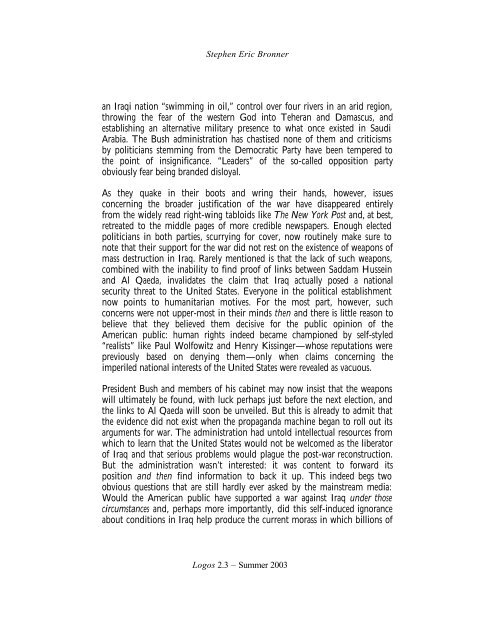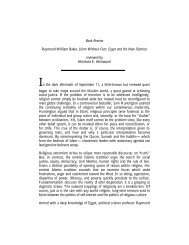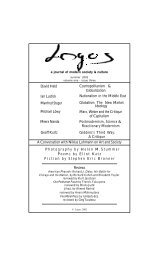Michael J. Thompson Stephen Eric Bronner Wadood Hamad - Logos
Michael J. Thompson Stephen Eric Bronner Wadood Hamad - Logos
Michael J. Thompson Stephen Eric Bronner Wadood Hamad - Logos
Create successful ePaper yourself
Turn your PDF publications into a flip-book with our unique Google optimized e-Paper software.
<strong>Stephen</strong> <strong>Eric</strong> <strong>Bronner</strong><br />
an Iraqi nation “swimming in oil,” control over four rivers in an arid region,<br />
throwing the fear of the western God into Teheran and Damascus, and<br />
establishing an alternative military presence to what once existed in Saudi<br />
Arabia. The Bush administration has chastised none of them and criticisms<br />
by politicians stemming from the Democratic Party have been tempered to<br />
the point of insignificance. “Leaders” of the so-called opposition party<br />
obviously fear being branded disloyal.<br />
As they quake in their boots and wring their hands, however, issues<br />
concerning the broader justification of the war have disappeared entirely<br />
from the widely read right-wing tabloids like The New York Post and, at best,<br />
retreated to the middle pages of more credible newspapers. Enough elected<br />
politicians in both parties, scurrying for cover, now routinely make sure to<br />
note that their support for the war did not rest on the existence of weapons of<br />
mass destruction in Iraq. Rarely mentioned is that the lack of such weapons,<br />
combined with the inability to find proof of links between Saddam Hussein<br />
and Al Qaeda, invalidates the claim that Iraq actually posed a national<br />
security threat to the United States. Everyone in the political establishment<br />
now points to humanitarian motives. For the most part, however, such<br />
concerns were not upper-most in their minds then and there is little reason to<br />
believe that they believed them decisive for the public opinion of the<br />
American public: human rights indeed became championed by self-styled<br />
“realists” like Paul Wolfowitz and Henry Kissinger—whose reputations were<br />
previously based on denying them—only when claims concerning the<br />
imperiled national interests of the United States were revealed as vacuous.<br />
President Bush and members of his cabinet may now insist that the weapons<br />
will ultimately be found, with luck perhaps just before the next election, and<br />
the links to Al Qaeda will soon be unveiled. But this is already to admit that<br />
the evidence did not exist when the propaganda machine began to roll out its<br />
arguments for war. The administration had untold intellectual resources from<br />
which to learn that the United States would not be welcomed as the liberator<br />
of Iraq and that serious problems would plague the post-war reconstruction.<br />
But the administration wasn’t interested: it was content to forward its<br />
position and then find information to back it up. This indeed begs two<br />
obvious questions that are still hardly ever asked by the mainstream media:<br />
Would the American public have supported a war against Iraq under those<br />
circumstances and, perhaps more importantly, did this self-induced ignorance<br />
about conditions in Iraq help produce the current morass in which billions of<br />
<strong>Logos</strong> 2.3 – Summer 2003




